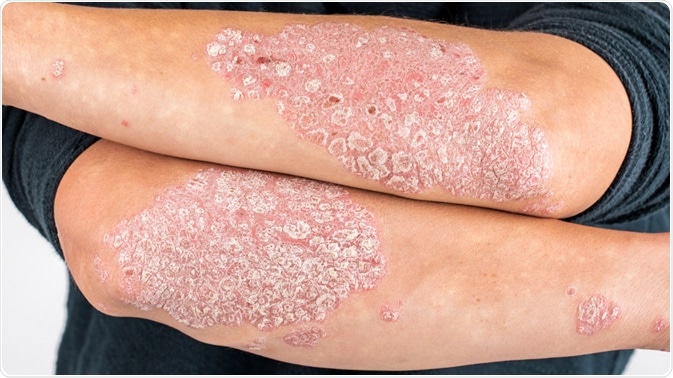Understanding the genetic influence on the molecular mechanisms and pathways that may cause psoriasis is useful in the prevention and treatment of the condition. Furthermore, this information can also assist in the identification of potential drug targets.

Image Credit: Fuss Sergey / Shutterstock.com
It is generally accepted by medical researchers that a hereditary component of psoriasis exists, as approximately 1 in 3 patients with the condition has a close family member who also suffers from psoriasis. Currently, it is believed that both genetic susceptibility and environmental factors are important in the development of psoriasis.
There are many gene mutations that may be involved in the pathology of psoriasis. To this end, research in this area has continued to discover more about the mechanisms and contribution of these genes on the immune system and inflammatory response of the body.
Genetic loci
Analysis of the classic genome-wide linkage has been able to identify genetic loci of chromosomes that are linked to psoriasis, which are referred to as psoriasis susceptibility. These include:
- PSORS1 (30-50% of cases of psoriasis)
- PSORS2
- PSORS3
- PSORS4
- PSORS5
- PSORS6
- PSORS7
- PSORS8
- PSORS9
Each of these loci is responsible for a significant part of the inflammatory response pathway in humans. Mutations in these genes are commonly found in patients who suffer from psoriasis.
PSORS1
The PSORS1 locus is particularly significant in the development of psoriasis and is believed to account for up to half of all psoriasis cases due to genetic susceptibility. The PSORS1 locus is located on chromosome 6 in the major histocompatibility complex (MHC) and is responsible for the response of the immune system, as well as the encoding of the skin proteins that are associated with psoriasis.
There are three genes in this locus that are strongly associated with psoriasis vulgaris, including:
- HLA-C, variant HLA-Cw6: This gene encodes for MHC class 1 protein.
- CCHCR1, variant WWC: This gene encodes for the overexpressed coiled protein.
- CDSN, variant allele 5: This gene encodes for the overexpressed corneodesmosin protein.
Understanding Psoriasis
Interleukin genes
Both the interleukin-12 (IL-12) subunit beta (IL-12B) and IL-23R are being investigated for their involvement in the pathology of psoriasis due to their strong association with the condition. Both of these interleukin genes are present in the up-regulation pathway for the gene for inflammation, tumor necrosis factor-α, and nuclear factor KB.
IL-12B exists on chromosome 5q and is linked to the expression of IL-12B. Comparatively, IL-23R is located on chromosome 1p and expresses the IL-23 receptor, which plays a role in the differentiation of T cells and their involvement in the inflammatory processes that cause psoriasis.
Other gene mutations
The identification of other gene mutations that may be involved in causing variants of psoriasis have also been identified with genome-wide association scans. The mechanism of these genes in the pathology of the condition varies and is not completely understood; however, they may affect the signaling proteins for inflammation.
A mutation in the gene that is responsible for encoding the CARD14 protein has been identified as a cause of psoriasis when combined with an environmental trigger. This genetic mutation can lead to the symptoms of the most common type of psoriasis known as plaque psoriasis.
References
Further Reading
Last Updated: May 18, 2021